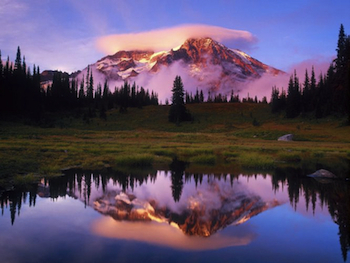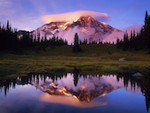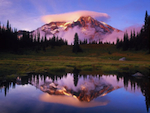By Amanda Moreno
I’m really trying to get my digital addiction to relax a little. It’s not really working, but I managed a few hours today without checking my email, and when I did I was delighted to see several emails pertaining specifically to the eclipse on April 4. I’ve been feeling hot rushes of anger swirling through me in cycles this week, some with triggers and some without. Therefore the contextualization provided by other astrologers is very much appreciated.

Photo by graywacke/A Landing a Day
I’m reading a lot about balance; about a tendency towards being resistant to the view of the other, with relationships at the focus. The self vs. other (Aries-Libra) polarity and mediating conflict with kindness in relationship seems to be the tip-of-the-tongue suggestion.
All of these are good insights. It also seems that so many of the email lists I subscribe to, be they astrologically focused or not, are providing totally generalized recommendations to really tune into the ‘love’ tones, to the heart, to try and greet every stimulus from a heart-centered, loving perspective.
I get it. It all seems like great advice. It also brings to mind what I lovingly refer to as “the priestess complex.” And let me tell you: those of us displaying that priestess complex, or those of us really working the relationship-karma-patterns angle, can get a little confused when we see things like “remember to be balanced and kind in relationship” — mainly because our go-to place is one of quite unconsciously surrendering to the needs of the other.
So what do I mean by “the priestess complex?” Well, it’s a term I probably shouldn’t just throw around casually, but I just did and so I’ll try to unpack it in a quaint, if not ridiculously generalized, little summary. I’m going to frame it in historical terms with a few basic assumptions: that my historical preview is limited in scope, and that even if you don’t believe in reincarnation and the effect of past lives on the current state of the soul, the story is a relevant tool for illuminating themes and concepts.
Let your mind spin backwards in time for a moment. Back way more than 10,000 years — which, by the way, is the average time span historians study, with anything before then being considered “pre-history” and therefore not worth studying. Imagine back to the time when the goddess reigned. Ok, wait — she didn’t really reign. That’s more of a patriarchal concept. Back when the life cycles, Moon cycles and natural cycles were revered.
The ‘goddess’ is depicted in bulbous statues and cave paintings. She has mega-curves. Humans begin to become conscious, to project onto nature and the sky; they develop practices and initiation rites. As consciousness becomes concretized within spiritual systems, ‘Priestesses’ initiate men into their sexuality (although sometimes, let’s face it, men were initiated through fairly brutal walk-abouts and rituals that involved blood and circumcision and sometimes resulted in death).
The sexual initiations, at least as far as we can gather through artifacts and modern interpretation, existed to initiate men into right relationship with sexual energy. But then, around the time of Babylon and its temples of ‘sacred prostitution’, the myth begins to change. Patriarchal themes begin to arise, the hero’s journey monopolizes the monomyth. The Babylonian Ishtar, turned Phoenician goddess Astarte, becomes Astaroth, a demon.
It all just kind of derails from there — although I’m a fan of thinking of the patriarchal cycle as a necessary part of our evolution. The priestesses and all of their lovely, chaotic, healing, devotional energy gets distorted to somewhat of a culmination in the Roman temples where the Vestal Virgins are the ‘keepers of the flame’ (see Eric’s article The Sacred Space of Self). Their chastity, their maintenance of that inner flame, and therefore the safety of civilization is valued above all, and yet…they are still used to ‘heal’ warriors coming home from war. And when they are caught in sexual acts they are buried alive. Good times.
There are also events like Beltane rituals, which still honor cycles of fertility, penetration, reception and sexual initiation. But by and large, it is changed. Control, possession and the cultivation of devotion overlaps with themes of chastity, purity and an utter distrust of raw, feminine power, which is unpredictable and chaotic. Even metaphorically speaking, these conflicting themes create distortions in the psyche.
Bringing it back to present — thank you for bearing with me — I have discussed the rising of the feminine here several times: the anger, the chaos, the ‘irrational’ cycles and patterns. It feels like for so many of us — men, women and gender-queer alike — we are remembering the force of so much power that has been repressed and distorted for so long. The snake is rising.
It can be terribly confusing, among other things. Then again, collective memories of being buried alive for helping to heal and for having sex as a means of healing can cause some confusion.
Bringing it back to the beginning of this article, to the ‘remember love’ thing, I had a moment earlier when I started laughing because, well, I have no problems remembering love or remembering to connect to the heart. I am so open and accepting and full of forgiveness and connection with the possibilities and ideals of people and of life, especially when it comes to romantic relationships, that I can deal with pretty much everything with devotional perseverance.
The problem is that that this devotional perseverance is completely undiscriminating. Or at least it has been in the past — I’m learning. For the ‘priestess,’ everything is about unconditional love and healing to the seekers. OK, maybe that is yet another over-generalization, but it is an important point. Especially, I would say, for the Pluto-in-Libra and Pluto-in-Scorpio generations. We are so geared towards relationships and merging that we lose sight of ourselves, our goals and our sense of discrimination very easily.
The fact is that the priestess complex carries all of the karma or patterns of betrayal and oppression and repression as well. The ability to trust the other, the instincts — and god, for that matter — is buried underneath centuries of distortion.
The fact that I embody so many shadowy Libra qualities of placation and surrender is quite the difficult confession for me. I’m a woman who has lived on her own and been quite independent for…well, my entire life. I’ve always shied away from Feminism because the practice of it speaks to me of victimization instead of the original ethos of equality for all, and I have never identified as a victim. But as I progress through life and relationship, I get more in touch with my own capacity to put the other ahead of myself, especially without receiving in equal measure, and it seems so unconscious that I am consistently surprised at its manifestations.
In that sense, embodying the Aries energy of the astrology right now seems so very appropriate, if not a little confusing and foreign. Remembering to keep the balance, to have patience, to take the point of view of the other in stride is, of course, prudent advice.
I’m also aware, however, that the anger is rising within me more fluidly lately and as far as I can tell I’m not alone in that. Figuring out what to do with it, how to channel it and how to avoid immediately projecting it onto the other is difficult, especially because of the discernment issue — when should it be discussed and worked through with the other, and when is the other just a catalyst for clearing my own stuff? How do we reconcile what feels like eons of repression and exploitation?
Listening to which parts of the anger are connected to my personal experience and what parts seem to be more of a collective channeling requires a brand of honesty that I strive towards but still fumble with. It’s worthy work, as the reclamation of the feminine in her true and robust form is so vital to constructively merging it with the masculine will in consort with divine will; or, more simply stated, in consort with a vision of a world where all parts are respected, loved and used for the highest good.
And so for me, at least at this point (writing three days before the event), this eclipse is very much about taking all of that love and light I ritualized into my life during the last eclipse (was it just two weeks ago?) and making sure it’s met with discernment, that my needs are being met in relationship, and that I am playing my part in evolving the priestess complex in constructive ways.
The priestesses are back, no matter their form and whether we take that metaphorically or literally. That devotional energy has to find its place among people who are willing to give and receive in heart-centered, equal exchange. It cannot be one-sided any longer. So here’s to using this eclipse energy to working together in ways that are discerning, discriminating and effectively loving.




